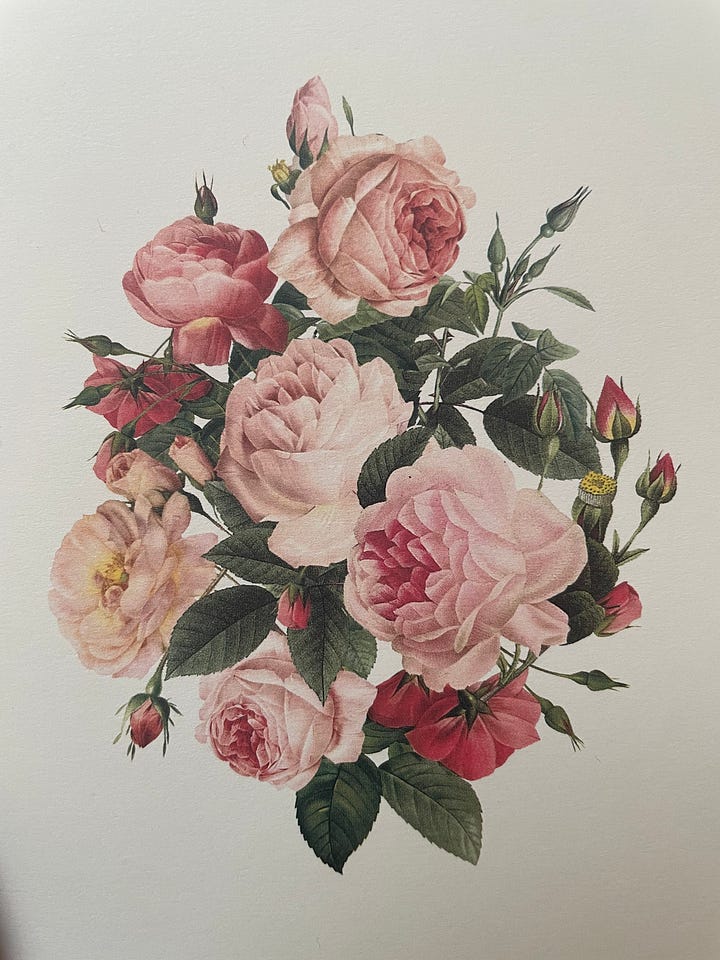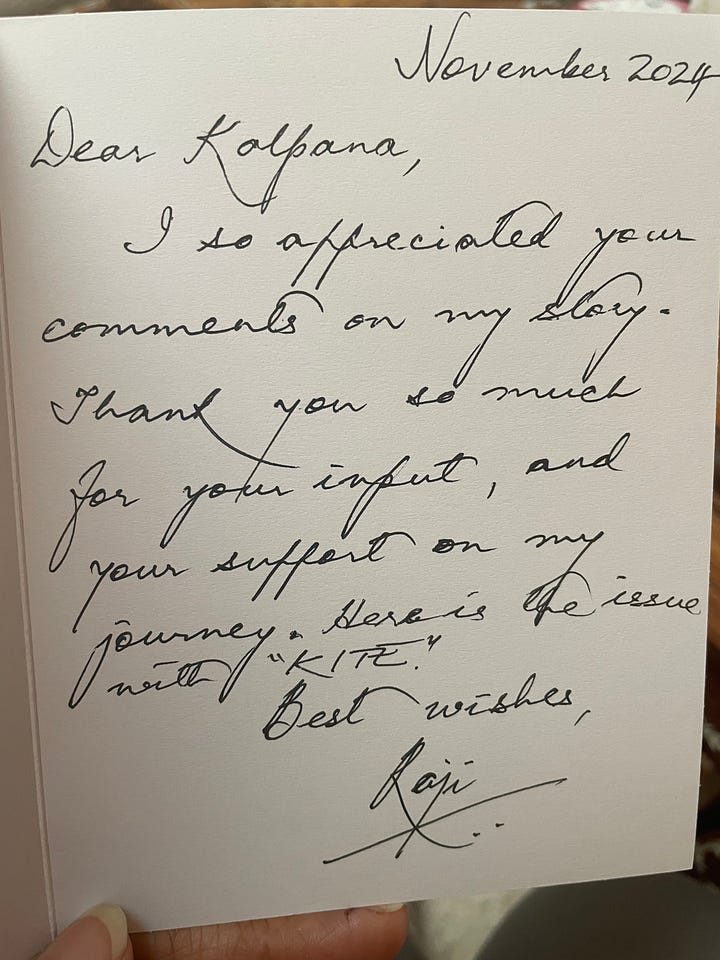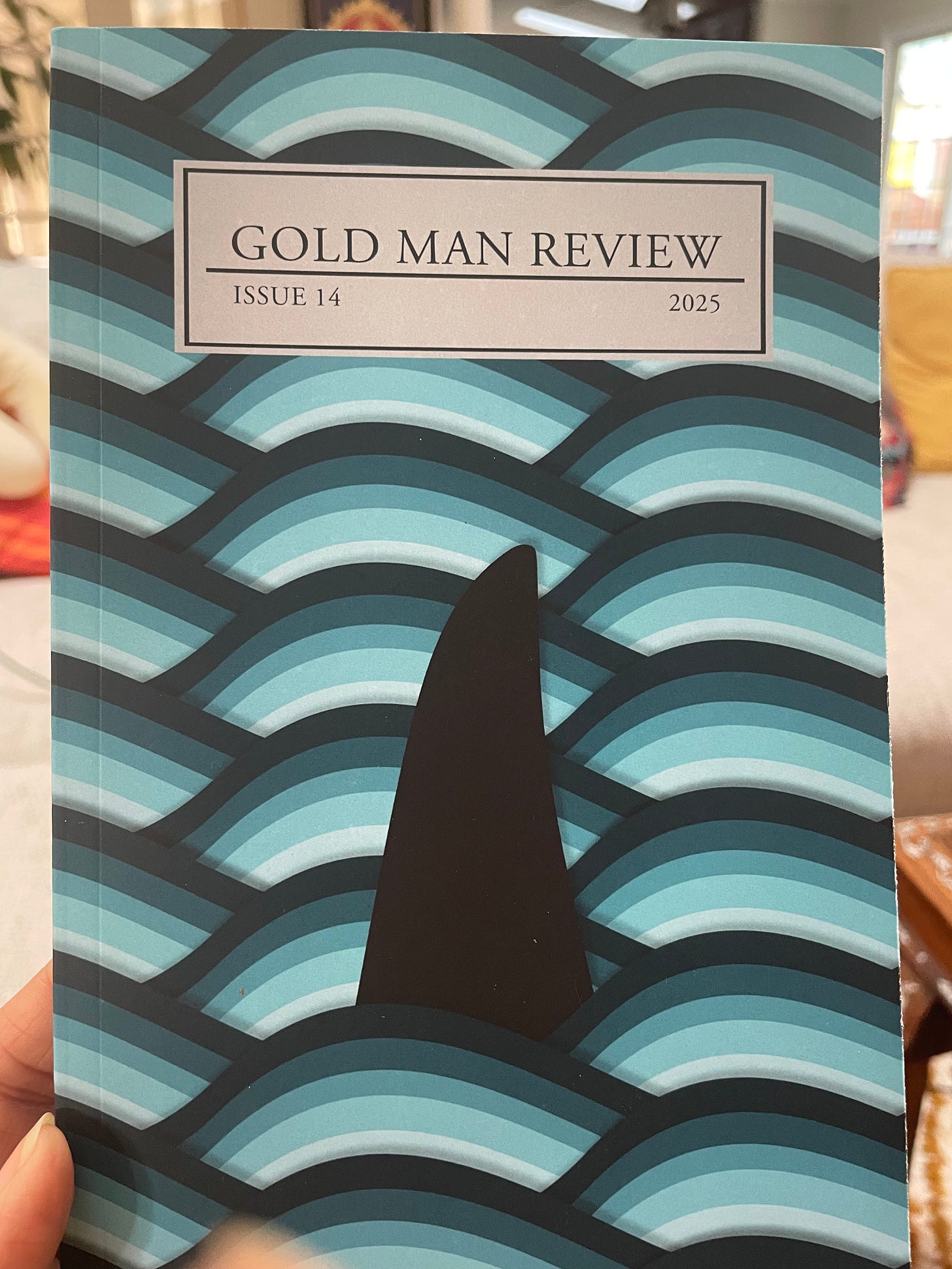WITH GRATITUDE THIS THANKSGIVING
I'd like to acknowledge someone's gratitude during this week of Thanksgiving. A card and a book came my way to remind me of yet another thing to be grateful for—someone else's gratitude.


I didn’t pick up a book to read this week because I had a lot going on during what is often one of the busiest weeks of the year for most families in the United States—the week of Thanksgiving. Instead of reading another book, I thought I’d write about a small thing that happened this week. I received a book in the mail from a wonderful person I happened to meet last fall.
In October 2023, this woman, Raji Pillai, was my interlocutor at an event at South Asian Literature Festival in Menlo Park. Raji is a scientist by trade. This “clinical, scientific and regulatory affairs” leader—with a doctorate in biological chemistry—is a sensitive reader who comes at a story with a lot of heart. I noticed last year what a close reader she was of my work and I was grateful for the opportunity to have been on the panel with her. Many attendees of the panel last year commended Raji on how thoughtfully she moderated our session.
Raji is also a sensitive writer, it turns out, and she has just published her first story in a literary journal. The note she sent me upon the publication of her first short story made me think about my own development as a more sensitive reader. Offline, she thanked me for having been one of the first few readers of her story “Kite” which just got published in Gold Man Review and she then sent me a note. “I so appreciated your comments on my story. Thank you so much for your input, and your support on my journey. Here’s the issue with ‘Kite,’” Raji wrote in the card that she had enclosed in the package along with a copy of Gold Man Review.
Raji Pillai has no idea how valuable this was for me. One of the areas I felt I really needed to work on was becoming a more thoughtful reader of all writing. I believe it takes a certain amount of selflessness to give oneself to another’s journey.
In the last few years, I began to understand how much maturity it takes to become a close reader of someone else’s work. As I began to read the creations of translators for Substack, this point was reinforced over and over again. In ome sense, translators must suppress their own voices to let the voice of the original writer shine through. They must make an extra effort at remaining invisible in a piece of work and that, in my view, takes largesse and empathy.
Three of my writing mentors have an abundance of both qualities. Years ago, I happened upon their talents at Kepler’s Books where we, along with several others, met monthly to critique one another’s writing. All three of my mentors had specific strengths; one of them was a book buyer and her greatest gift was to point us to works that would somehow broaden our world as it related to the work we had just submitted. She was the only one among the four of us who had plodded through an MFA program and she told me how she had to read about eighty or more books through the course of her MFA residency.
It was a moment of reckoning for me that I had not spent any time reading. I didn’t do anything about it, however, until the year 2021 when I began reading in earnest simply in order to understand life in the Far East. I wrote about the experience of reading in order to understand the history of some nations, and this note and several others brought me to what I subsequently titled LETTERS FROM EVERYWHERE.
As part of my weekly Substack posts, I’ve read some 150 books across more than forty languages. Each time I read, I try to connect something in the work to some aspect of my own personal life. It’s difficult for me to read a work without reflecting on how it applies to me in some way. For me that is indeed the power of art—to make us reflect on how else we may wish to grow and transform ourselves. In 2022 Elena Ferrante’s brilliant treatise on the nature of female friendship gave me tremendous perspective early this year during the course of some events in my personal life. A book I bought in South Africa this September made me wonder about solitude and the resilience we need to build inside ourselves in order to confront solitude. A Palestinian book I talked about a few weeks ago upset my Israeli friends in Haifa and I wondered, for a moment, if I must stop writing about controversial topics even as I realized that this sort of self-censoring is not healthy at all. I told myself I must continue to do what I do while remembering also that every human being in the world has the right to his or her own truth, too, and that I must also be ready for all that comes my way.
I close this post by thanking Raji Pillai for the terrific opportunity to read her short story in its early stages. I’m so glad that “Kite” was born in the pages of Gold Man Review’s Issue 14. I look upon her first publication in the literary journal with a smidgen of vicarious pleasure for it is an acknowledgment of my infinitesimal role in its birth, too. For that and more, I’m ever so grateful.



